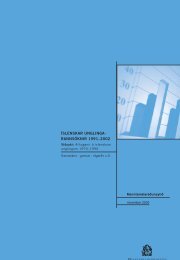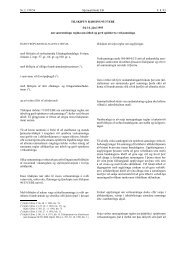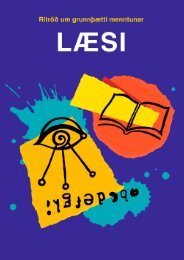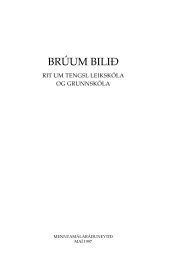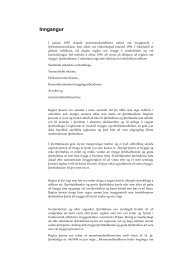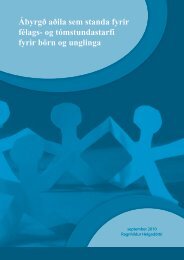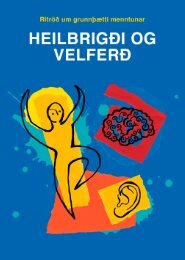Arts and Cultural Education in Iceland : Professor Anne Bamford
Arts and Cultural Education in Iceland : Professor Anne Bamford
Arts and Cultural Education in Iceland : Professor Anne Bamford
You also want an ePaper? Increase the reach of your titles
YUMPU automatically turns print PDFs into web optimized ePapers that Google loves.
eg<strong>in</strong>ners; pedagogical tra<strong>in</strong><strong>in</strong>g; communication <strong>and</strong> observation of teachers <strong>in</strong>side <strong>and</strong> outside<br />
schools. This course started 2 years ago as extensions of the music programme, but less than<br />
50% of the students take this pathway.<br />
It was also argued that the lack of distance education courses <strong>in</strong> the arts limited professional<br />
development.<br />
To get qualified the music teachers have to go to Reykjavík for qualification. Why can music teachers not get<br />
qualifications without go<strong>in</strong>g to day school <strong>in</strong> Reykjavik? This appears really important po<strong>in</strong>t. This has been an<br />
option for general teachers so why not <strong>in</strong> music?<br />
The counter position though argued that a distance mode may not work for the arts, as the<br />
follow<strong>in</strong>g quotes suggest:<br />
We don’t do distance learn<strong>in</strong>g. I don’t th<strong>in</strong>k it works for this type of learn<strong>in</strong>g . I am personally<br />
<strong>in</strong>to it but it’s no good for arts education. We tried it <strong>and</strong> student evaluations were very low.<br />
We have given it up <strong>in</strong> music.<br />
Distance education is good, but difficult to do <strong>in</strong> the arts – gett<strong>in</strong>g the students for 2-3 weeks a year for 2-3<br />
hours, otherwise the only contact is through the computer.<br />
While there is a commitment to research at the policy level, there is less current research<br />
activity from the teacher education sector itself. With<strong>in</strong> the teacher education <strong>in</strong>stitutions for<br />
primary teachers <strong>and</strong> the early years of high school, research appears to receive little priority.<br />
5.3 Quality monitor<strong>in</strong>g<br />
‣ The arts educational community <strong>in</strong> Icel<strong>and</strong> needs to consider methods of quality<br />
assurance that are appropriate <strong>in</strong> this context<br />
With<strong>in</strong> Icel<strong>and</strong> there are claims of good quality <strong>and</strong> equally strong claims of fall<strong>in</strong>g quality.<br />
The contention of this research would be that <strong>in</strong> a general sense <strong>and</strong> compared to other<br />
countries, Icel<strong>and</strong> has a strong commitment to the arts <strong>and</strong> the quality is strong.<br />
To ensure this cont<strong>in</strong>ues to be the case <strong>and</strong> that areas that can be enhanced receive<br />
adequate attention, ongo<strong>in</strong>g systems of quality monitor<strong>in</strong>g should be considered. Peer<br />
evaluation <strong>and</strong> <strong>in</strong>ternational benchmark<strong>in</strong>g should become a regular part of Icel<strong>and</strong>ic arts <strong>and</strong><br />
cultural education.<br />
There are laws that say that every school should be do<strong>in</strong>g the arts but there is so much decentralisation that we<br />
do not know if everyone is follow<strong>in</strong>g it, are they implement<strong>in</strong>g it; there is no monitor<strong>in</strong>g. The law needs to<br />
emphasise check<strong>in</strong>g a lot more. We are wait<strong>in</strong>g for the new curriculum.<br />
All types of arts education should be evaluated, <strong>in</strong>clud<strong>in</strong>g what occurs <strong>in</strong> after school<br />
activities. Importantly, young people need to be <strong>in</strong>volved <strong>in</strong> quality monitor<strong>in</strong>g <strong>and</strong> the results of<br />
such monitor<strong>in</strong>g need to be shared with service users <strong>and</strong> parents. Informally, especially <strong>in</strong><br />
smaller communities, a great deal of <strong>in</strong>formal evaluation does occur <strong>and</strong> pupils <strong>and</strong> parents will<br />
make choices <strong>in</strong> terms of perceived quality, as the follow<strong>in</strong>g quote suggests:<br />
The parents wouldn't know, but people do ask around. The policy is that the schools should have self evaluation<br />
policy <strong>in</strong> addition to the external evaluation that is done. Annually, we can only externally evaluate few schools –<br />
e.g. sample 4-5 preschools <strong>and</strong> 3-4 compulsory schools. There is no official rank<strong>in</strong>g of schools. There is however<br />
more student evaluation <strong>in</strong> the compulsory schools (st<strong>and</strong>ardized tests).<br />
Parents <strong>in</strong> the focus groups were keen to ga<strong>in</strong> more <strong>in</strong>formation about quality <strong>and</strong> saw<br />
quality as be<strong>in</strong>g an important issue:<br />
We should focus on the ma<strong>in</strong> th<strong>in</strong>gs <strong>and</strong> make sure students get quality teach<strong>in</strong>g.<br />
I want my children to have a choice <strong>and</strong> be taught properly<br />
110



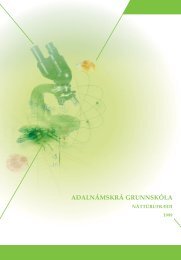
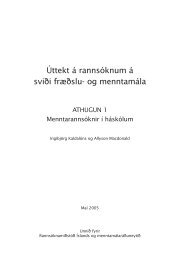
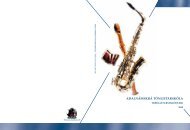
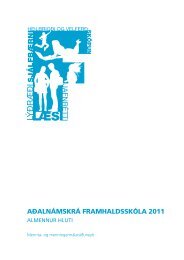
![Aðalnámskrá tónlistarskóla : rytmÃsk tónlist [Eingöngu á rafrænu formi]](https://img.yumpu.com/50843672/1/184x260/aaalnamskra-tanlistarskala-rytma-sk-tanlist-eingangu-a-rafranu-formi.jpg?quality=85)

